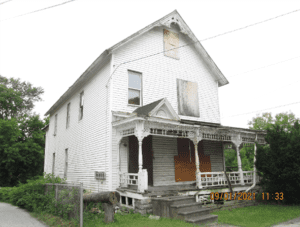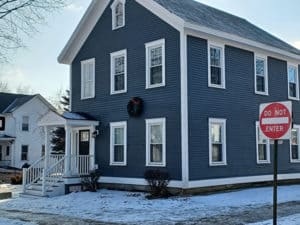By Julia Purdy
Editor’s note: This story follows up on “Rescuing Rutland neighborhoods, one house at a time,” dated April 12, 2018.
Around 2017, the city of Rutland launched an innovative plan to convert vacant or blighted city-owned properties to functioning residences by offering selected addresses for sale to contractors, investors or new owners who will rejuvenate them and get them back on the tax rolls. Many cities, including Buffalo, New York, and St. Louis, Missouri, and even small towns throughout Italy (the “1 euro House Project”) have embarked on such arrangements , anxious to rescue their crumbling townhouses.

This property at 200 Columbia Ave garnered only one offer.
Three years later, the Rutland program has new names at the helm, but the program remains a success, according to Andrew Strniste, administrator of planning and zoning and chair of the city-owned properties committee. He told the Mountain Times that the current housing market is showing more interest than in previous rounds.
Strniste has been on the job since April 2021, replacing Tara Kelly, who helped design the program. Most recently he served as planner and zoning administrator for Underhill, and previous to moving to Vermont he worked as transportation planner for Connecticut Dept. of Transportation and a planning consultant in North Dakota.
Available properties are offered in batches, or rounds. The application period for the December round ended Jan. 7, and the city-owned properties committee was to present its recommendations at the Board of Aldermen’s meeting on Tuesday, Jan. 18.

A success story: a nice home after renovations at 31 East St.
Four properties were marketed: 200 Columbian Ave., 156 South St., 158 South St., and an address not listed here because it is occupied.
Columbian Avenue and 158 South St. garnered only one application each, while four were submitted for 156 South St., a mobile home that was damaged by fire. The occupied house, located in the neighborhoods east of Route 7, attracted five applications.
The February round, which is tentatively scheduled to end Feb. 25, will include 24 Division St. (a vacant lot), 157 State St., 33 Summer St., and an address which is occupied.
Strniste is currently developing a schedule of open houses for these properties. The open houses will be announced on the City-Owned Properties webpage at rutlandcity.org.
While the program is limited to properties taken for back taxes, it is not a tax auction. The committee makes decisions on applications received from prospective purchasers for specific houses. The amount sought by the city for each property is listed on the City-Owned Properties webpage so applicants can take it into consideration in their bid, but there is some flexibility based on the condition and expense of renovating the building, Strniste said.
The program’s overarching goal is to transfer city-owned properties to private owners who will upgrade, reduce neighborhood blight and contribute to the housing stock while covering fees, back taxes and any city expenditures to keep a property up to code, if occupied prior to the transfer.
The rules require the applicant to submit a price, the redevelopment plan for the property, and what the applicant intends to do with it when completed — whether occupy it as a principal residence or as an investment. An incentive to owner-occupants is the residential tax stabilization program, which freezes the assessed value at the time of purchase for three years and requires occupation of the property as the applicant’s primary residence for that period of time.
There are no prohibitions on resale of the rehabilitated property, and multifamily housing takes priority.
The taxes owed will be payable by the new owner, including carrying costs, upon closing. Final approval will consider the amount recovered by the city along with the plan for development. Applicants must be in good standing with the city. The “dollar amount” offered should include back taxes, time frame for completion, planned dollar investment, preservation of multifamily buildings. Any bid that exceeds the amount owed to the city is returned to the previous deeded owner.
The city also observes landlord-tenant law in cases where renters are currently in residence. When that is the case, the city effectively becomes a “property manager,” ensuring safe, sound and sanitary conditions until the property sells. After that, the new owners are responsible for health and fire safety, and to follow landlord-tenant law.
Even though the majority of city-owned houses are not in move-in condition, they must be capable of being upgraded to occupancy standards, and fire and health codes must be met in the final project.
For properties beyond rescue, demolition is not an option, but an asbestos survey and a demolition permit are required.
Renovation plans may include everything from sheetrock replacement to major rehabilitation, such as structural repair. Building Inspector Mark Sadakierski, who brings a strong background in construction to his new position, told the Mountain Times he stops by ongoing projects and keeps his office open to any and all questions.
For more information, visit: rutlandcity.org.




